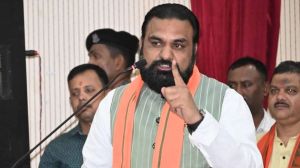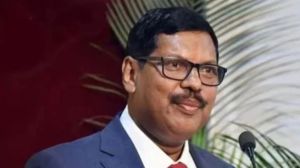Congress sharpens OBC focus down the party ranks, Rahul Gandhi takes the lead
Congress recently held meetings with state-level OBC units, to concentrate on OBC share beyond politics, in different spheres
 Chhattisgarh CM Bhupesh Baghel and Congress leader Rahul Gandhi give a 'cheque' to a beneficiary during the launch of the Gramin Awas Nyay Yojana in Bilaspur on September 25. (PTI)
Chhattisgarh CM Bhupesh Baghel and Congress leader Rahul Gandhi give a 'cheque' to a beneficiary during the launch of the Gramin Awas Nyay Yojana in Bilaspur on September 25. (PTI) Three days ago, the Congress leadership summoned the heads of its state-level OBC departments to Delhi for a brainstorming session. The signal to them was clear. Apart from “propagating the message” that the party was now speaking strongly for OBCs, they have to compile district-level data on OBC share in terms of wealth and power – like in agricultural land, government contracts, access to credit from banks, representation in private educational institutions and enterprise development.
This follows Rahul Gandhi’s recent focus on representation for OBCs and push for holding caste census, now extending to mention of the low representation of the backward classes in bureaucracy.
Addressing a public meeting at Bilaspur in Chhattisgarh Monday, Rahul again argued that caste headcount was key, “if we want to give participation to OBCs, Dalits, tribals and women”.
In many ways it is a historical course correction for the Congress. The party’s critics often cite Rajiv Gandhi’s September 1990 speech in the Lok Sabha during a discussion on the Mandal Commission report, when he said that the V P Singh government’s policies “are not very different from what the Britishers were doing”. “It was the British who tried to divide our country on caste and religion and today it is the Raja Sahib, sitting there, who is trying to divide our country on caste and religion,” Rajiv said.
He added: “… not that this report is worthless, and should be thrown away. There is a lot of substance in the report, but to say that you will just accept it like that, without discussing it or without debating it, is not adequate… We have problems if caste is defined to enshrine casteism in our country… The Congress cannot stand by and watch this nation being divided for the political convenience of one individual.”
The former PM said: “… let us not have one man’s obstinacy holding India hostage, let that man’s obstinacy not lead to children getting killed (several youths had attempted self-immolation following the adoption of the report). Let that man’s obstinacy not lead to caste war… I appeal to the whole House, I appeal to the patriotism and patriotic feelings of every member in this House not to remain idle.”
What followed was the Congress’s electoral slide in the Hindi heartland, with the Ayodhya Ram temple movement adding to the blow dealt by Mandal. While the upper caste Hindu vote moved to the BJP, the party’s OBC, SC and ST vote bank went to caste-based social justice parties (the RJD, JD-U, BSP and SP).
Since then, the Congress has made amends, with the realisation also settling in that if Hindutva was about bringing all Hindus under one umbrella, caste was a powerful antidote to it.
So, if the implementation of the Mandal commission report began under the P V Narasimha Rao government, the UPA I government of 2004-09 came out with a 27% quota for OBC students in higher education institutions, including IITs and IIMs. And when it could not get the women’s reservation Bill passed in 2010 without a quota within quota for OBCs, the UPA government conducted a socio economic and caste census (SECC) in 2011. The data for this was, however, not released.
At his press conference after the women’s reservation Bill was passed, Rahul addressed both issues, saying he “100% regretted” that the UPA government had not included OBC quota within the women’s quota Bill. He also said that the UPA government should have released the data of the SECC.
A Congress leader said there is no denying that successive Congress governments had sat on the Mandal Commission report, till V P Singh decided to act upon it. At the same time, the leader said, “It is also a fact that the first job to an OBC under OBC reservation was under the Rao regime. The Congress government also brought in Mandal 2.0… Much empowerment, educational empowerment happened via reservation for OBCs in higher education institutions during the UPA time… But somehow a narrative that the Congress has not taken the OBC issue forward has subsumed all of Congress efforts.”
The leader also points to Rahul’s talk of OBC representation in different levels of government. While the growth of OBC-vote bank parties means backward classes occupy political power, he said, “it has not really translated much into economic and educational gains for OBCs”.
The Rahul rethink is also a step away from his focus in his early years to develop as a leader championing the cause of Dalits and tribals, apart from the party’s focus on minorities. The string of electoral reverses since 2014 has forced the party to look at the social justice prism afresh.
In 2018, the party appointed two chief ministers – Ashok Gehlot and Bhupesh Baghel — from OBC communities. Now, of its four CMs, three are OBCs, counting Siddaramiah.
In 2020, then Congress president Sonia Gandhi, in a letter to the Prime Minister, flagged the issue of “denial of reservation for OBC candidates under All-India Quota being filled through National Eligibility cum Entrance Test in State/UT Medical education institutions”.
A senior leader lists: “Some months ago, Rahul spoke about the need to remove the 50% cap on reservations. He has also been demanding a caste census. Both the demands have found place in the recent CWC resolution. The latest call is reservation for OBCs in the women’s Bill.”
One leader says the formation of the INDIA bloc also helps this new push. “Now the Congress can work closely with parties like the RJD, JD(U) and the SP to unite the backward classes – a majority of which have moved to the BJP since 2014.”
Another senior leader says the Congress perhaps needs to do more to make the people understand why it is seeking a caste census, and what it would do once the count was done. “Only then will people rally behind us… That kind of conversation has to happen.”
Asked about the recent meeting with heads of state OBC departments, K Raju, the Congress’s National Coordinator for SC, ST, OBC and minority departments, told The Indian Express: “It is not enough to just look at how many OBC MPs or MLAs are there. We need to see whether the political empowerment is getting converted into economic gains… We are planning to hold seminars at district levels, create awareness among OBCs, that their fight should go beyond demanding share in the political power, they should also demand a share in the economic and educational sphere.”



- 01
- 02
- 03
- 04
- 05




























